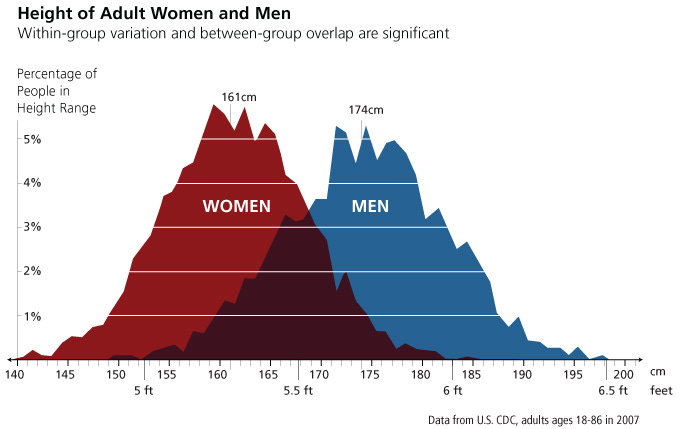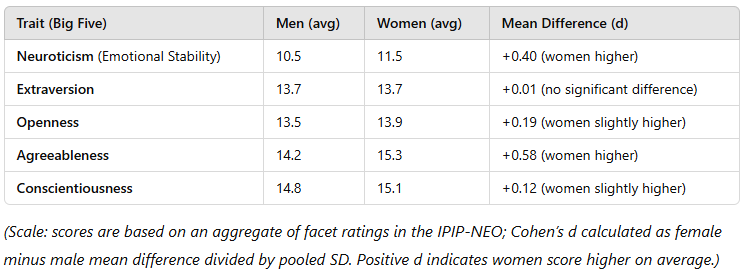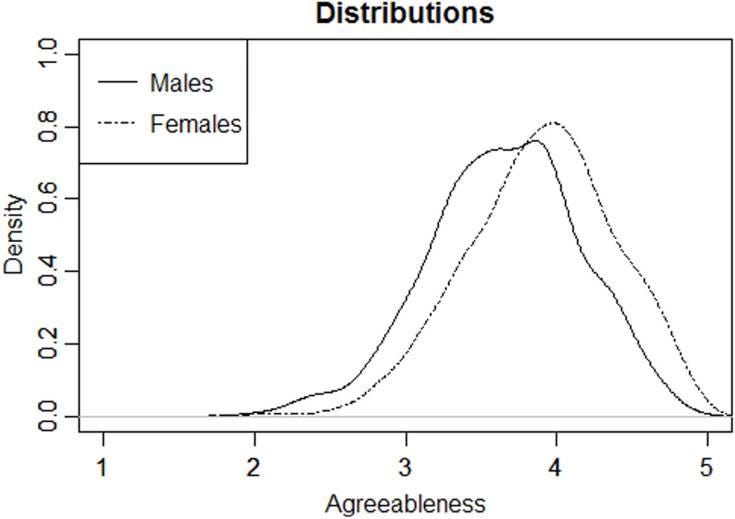Men and Women are Not That Different
Physical Differences Are Large
There’s a lot of (understandable) overcorrecting going on with Gender Discourse. My best friend Eneasz is a good example of a common experience. He was lied to in childhood and told that there is basically no difference between men and women, to the point that he didn’t understand why the women’s World Cup soccer team wouldn’t be a good match for the men’s team.
Here I was, in my late 30s, still believing that men and women are basically the same, like a fucking chump. Do these people realize how much of my life, my personal and public decisions, my views of my fellow man and my plans for the future, were predicated on this being actually true? Not a single person had ever once bothered to take me aside and whisper “Hey, we know this isn’t actually true, we’re just acting this way because it leads to better outcomes for society, on net, if we do. Obviously we make exceptions for the places where the literal truth is important. Welcome to the secret club, don’t tell the kids.”
Physically, men and women have enormous differences. Matt Yglesias covered this well in his post titled, appropriately enough, “Men and Women Are Different,” where he posted this graph of height:
I’m just eyeballing this chart (data is here if you want to do a more thorough analysis), but it looks to me as though there’s only about 30% or so overlap. So when you say something like “men are taller than women,” you really are talking about the vast majority. Measures of other obvious differences like upper body strength and muscle mass tend to follow similar distributions. When people insist that physical differences between men and women are small and insignificant, they are either deluded or lying.
Personality Differences are Small
The overcorrection comes when people see physical difference and think there must be comparable personality difference. Here is Yglesias again, from the same article:
Men and women also have different personalities, which I think people do tend to notice (again, there are many jokes about this) but is a little harder to measure.
On the tests that do try to measure it, men and women have different distributions. The biggest differences are that women are more compassionate, more withdrawn, and more polite. Women also score higher on emotional volatility, with the exception that men score higher on the “anger” and “angry hostility” dimensions of emotional volatility.
This is all true, but Yglesias conveniently leaves out the magnitude of the differences. He posts a striking graph when it comes to the height distribution, showing large differences and little overlap. But when it comes to personality, suddenly we have no numbers to discuss.
So let’s discuss some numbers. I asked OpenAI’s Deep Research to take a crack at it, and it found that women and men have significant differences when it comes to the Big Five personality traits, and crucially, it put some numbers on it:
Women tend to score moderately higher than men in Agreeableness and Neuroticism, with standardized mean differences (Cohen’s d) around 0.3–0.5 (women higher). This corresponds to a partial overlap of distributions – roughly 70%–80% overlap – indicating substantial similarity despite the mean difference. Smaller sex differences are observed for Extraversion and Conscientiousness (usually d ≲ 0.15), with women scoring slightly higher on average (or virtually equal). Openness to Experience shows negligible average difference (d ≈ 0.0 to 0.1) in most datasets.
(Note: Deep Research was confused and listed extraversion as d=0.1 in the chart, but openness as d=0.1 in the narrative. In this meta-analysis, openness has the lowest d of 0.2, and the other scores are consistent with the above narrative.)
So for the traits where men and women diverge the most, there is still 70%-80% overlap. Other traits have even more overlap. So when you start talking about how men and women’s personalities differ, you’re not even talking about a bare majority. You’re only talking about the tails of the distribution. That’s fine if that’s what you want to talk about, but if you want to talk about men and women’s personalities in general, you ought to be talking about how they’re mostly the same. It’s only at the extremes were they diverge. For a visual aid, here is a chart from the study Yglesias linked to:
Contrast this to the graph of physical differences. A lot of people like to take the very small part of the graph where the sexes diverge and label that “how men are” and “how women are,” but that’s an extremely sexist thing to do. By the numbers, how women are is mostly just how men are.
Culture Magnifies the Differences
While personality differences mostly overlap between men and women, lots of actual behaviors diverge much more due to cultural factors. It’s easy to point at the current dating landscape, where men are expected to be the pursuers, and say that’s just the natural order. But there have been a lot of dynamics that were once considered the natural order which have changed. Especially around dating, norms are always shifting. The modern dating landscape looks nothing like it did 50 years ago.
Gendered norms are also heavily policed by culture. There’s a whole cottage industry of people declaring what is and isn’t gender-appropriate and shaming people into compliance. I wrote about how our culture does this to both sexes over a decade ago.
There’s a long, storied history of pointing at the status quo and declaring it evidence of some sort of natural equilibrium. For a long time, in Western culture, it was assumed that women were naturally suitable only for being homemakers. Sure, there were a few exceptions, but the vast majority of women’s seemingly greatest aspiration was to be a wife and mother. In some cultures, this is still the case, and people in those cultures routinely argue that this is simply the natural order, and it’s wrong to “force” women into the workforce.
But here in the US, the majority of women’s participation in the workforce has grown over the last 75 years, and is now at a level only slightly below men’s.
It would be easy to point at this chart and declare that, actually, women and men are naturally suited to workforce participation in roughly equal numbers. But the truth is that nobody knows and there is no natural order. This type of thing will always be culturally influenced, and there’s no reason to assume that the current state of the world represents some kind of ideal or enduring truth.
This Post is About Dating
I’m not really criticizing Yglesias, because his post was about the political consequences of sex differences, where even small differences need to be acknowledged and appreciated. But I am here to criticize a lot of Dating Discourse. Dating has heavily gendered norms, the strongest of which is that men do the asking and women do the responding. I criticized this dynamic in my last post, where I encouraged women to exercise more agency in their dating lives by taking the initiative and asking men out instead of passively waiting.
Jacob Falkovich - who is quickly positioning himself as my intellectual foil on this topic - recently published a three-part series on sex differences in dating, where he endorses the main idea of Men Are From Mars, Women Are From Venus - that men and women are so different, they are practically alien species. He specifically criticizes my take that women should ask men out:
I will propose a radical idea: the reason that most women don’t care for this sort of advice is neither that they are stupid nor cowards. It’s just not how women do things.
Of course, in his next breath, he admits that is how some women do things, and that it usually works out well for them, but then seems to forget that for the rest of the post. The entire post is about establishing strict dichotomies regarding how men are vs. how women are.
In Jacob’s view, encouraging women to take a more active role when it comes to finding partners is telling them to be “man-like” and only happens because men aren’t performing masculinity well enough.
When I pointed out the sexism of that view, Jacob was not amused:
I will propose a radical idea: women are just as capable of direct communication as men, and it’s sexist to suggest otherwise. Countless writers have articulated better than me about the importance of direct communication in dating and relationships, and I have yet to see anyone successfully defend relying primarily on indirect communication. It’s certainly a skill, and not one that everyone has, but there’s no reason to believe any differences are inherent, or if they are, that they’re any more pronounced than other personality differences. To suggest otherwise is a familiar idea - the soft bigotry of low expectations.
In 2021, right-wing media had some fun laughing at the The National Museum of African American History and Culture for publishing an “anti-racist” graphic suggesting that things like work ethic, planning for the future, and rational thinking were aspects of “whiteness.” The suggestion that non-white people were somehow inherently less rational, hard-working, and capable of planning was seen as comically racist. I view that similarly to the idea that women are somehow less capable or temperamentally suited to communicating directly.
I call this kind of attitude an overcorrection because it’s part of a cycle of backlash. Back in the day, it was widely believed that women couldn’t be trusted to do things like own property, vote, hold jobs, or have any sort of leadership over men because they were just inherently different. There was a feminist backlash to that idea (reinforced by certain strains of trans ideology) which emphasized the similarities between the sexes, and often went too far by insisting that there were no material differences. Now there’s a backlash to that idea which emphasizes the differences, and it’s overstating the magnitude of personality differences.
You Can Choose Your Player
Jacob has another post arguing that dating is not about following rules, it’s about playing roles. This post is emblematic of my frustrations with Jacob’s writing. It’s a really good insight! Nearly everything he says is true and helpful. There’s a reason I’m a paying subscriber to his blog. But then he insists that one of the roles is for men, the other is for women, and never the twain shall meet. This is exactly the kind of gender role enforcement I was talking about above.
In the current dating landscape, men are expected to perform the “masculine role,” which means that “guy is supposed to make move, guy is supposed to propose, guy is supposed to ‘lead’; girl is supposed to signal availability/interest, girl is supposed to gatekeep.” But there’s nothing natural or inherent about that. Even if the average man is better suited to the “masculine” role, it’s important to remember that while men and women strongly diverge physically, personality differences are relatively small. So if you push all men into the “yang” role and all women into the “yin” role, you’re going to be creating a lot of mismatches.
I know this because, like Jacob, I know many women who take the so-called masculine role when it comes dating, relationships, and agency in general, and they love it. Likewise, tons of men prefer a more traditionally feminine role. Jacob looks at that and sees a crisis of men not performing masculinity correctly.1 I look at it and see our culture (Jacob included) trying to stuff people into boxes they don’t fit into. It blows my mind that Jacob can say something like
If I have a goal with respect to my male readers, it’s to inspire them to masculine virtue in their dating lives. To take ownership, set clear intentions, communicate with honesty, and pursue what they value with courage and agency.
and somehow exclude women from this, as if honesty, courage, and agency are the exclusive province of men. I value those virtues and hope everyone of every gender cultivates them. I’m not advocating for women to be “man-like.” I’m challenging all people to display the virtues that I care about.
When I discuss dating, marriage, or romance, my goal is to encourage people to define their own roles. Think about what you want out of a relationship, what role you want to play, and what type of person would find that valuable, then try to meet that person. All of this involves tradeoffs. The less popular your role, the harder it will be to find a suitable partner, but often that means you’re also very hard to find, so the right person will be overjoyed to meet you.
It also makes sense to use some discernment in choosing a role. There is value in learning a role that doesn’t necessarily come naturally. As anyone involved in the kink community knows, there is a shortage of good dom(me)s. Lots of people (men and women) would be well served by cultivating a taste for such an in-demand role. If that idea appeals to you, go for it! And anyone helping people to appreciate and learn the role is doing the lord’s work. When I encourage women to ask men out, I’m pointing out how that approach works well and will likely accomplish many women’s stated goals, even if it doesn’t necessarily come naturally. It’s not about being “man-like,” it’s about being effective.
I draw the line, however, at suggesting that it’s mandatory. Men can be submissive, or househusbands, or take the yin role, as long as they do so with eyes open. Women can be heads of household, type A, lead Fortune 500 companies, and run countries. Even if most women, in our current environment, don’t do (or even want to do) those things, that doesn’t make them “masculine.” It just means that people are choosing the role they are most comfortable with.
I do find it interesting that far fewer people have a problem with women adopting the “masculine” role in dating. To me, it suggests a view of the male role as burdensome and the obligation of men to shoulder that burden. So when men fail to do it, they’re not living up to their obligations, but when women do it, they’re doing us a solid.











Interesting essay, but I disagree on several points.
There are psychological differences between men and women that are much larger than the ones you mention. The biggest is also the most obvious: sexual attraction! Men are significantly more likely to desire women, and visa versa. You also have less banal differences that are significant in magnitude, such as occupational interests (https://pubmed.ncbi.nlm.nih.gov/19883140/). Also (most relevant to this article) is the differences between what men and women want out of a relationship (https://www.cambridge.org/core/journals/behavioral-and-brain-sciences/article/sex-differences-in-human-mate-preferences-evolutionary-hypotheses-tested-in-37-cultures/0E112ACEB2E7BC877805E3AC11ABC889). The effect sizes for these differences are all quite large
Cultural differences in personality are actually magnified the more egalitarian the society tries to be.
While non-traditional gender roles can work, they are much less likely to (e.g. rate of divorce for couples where the wife is the primary earner are a fair bit higher than where the man is the primary earner).
Subscribed